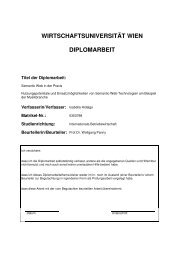Wirtschaftsuniversität Wien Magisterarbeit - SemanticLab
Wirtschaftsuniversität Wien Magisterarbeit - SemanticLab
Wirtschaftsuniversität Wien Magisterarbeit - SemanticLab
You also want an ePaper? Increase the reach of your titles
YUMPU automatically turns print PDFs into web optimized ePapers that Google loves.
implementation available although the standard has been available for years. One of<br />
the biggest e-commerce websites on the Internet, amazon.com, is far away from having<br />
a valid and meaningful P3P policy in place. And even IBM, which was heavily involved<br />
in designing P3P, does not have a P3P policy in place which is all-working. Of course,<br />
one could argue that IBM is a huge organization and that there is little chance that the<br />
webmasters know the people which were involved in designing P3P. But that exactly<br />
is the point: P3P has yet not arrived in the heads of people responsible for users’ and<br />
customers’ privacy. And if people who on a daily basis deal with privacy issues don’t<br />
know or care about P3P, how should normal Internet users?<br />
If users would know about privacy standards, they could in theory demand an implementation<br />
of a certain standard from their software vendors. Unfortunately, this is<br />
not the case yet, so software vendors do not have the pressure of implementing privacy<br />
standards such as P3P. And although even the W3C acknowledges that there is a lack of<br />
support for P3P and therefore decided to suspend the work on it, there is a flicker of hope<br />
for P3P: Microsoft Internet Explorer. Maybe in some future release of MSIE, Microsoft<br />
will implement a P3P configuration that users can influence. The second flicker of hope<br />
for some of the privacy standards described in this thesis is the business community.<br />
Maybe not all users are aware of privacy issues, but business certainly are. So maybe<br />
the business community develops enough pressure on software vendors to implement<br />
useful privacy standards.<br />
Until then, users have to find other solutions to protect their privacy on the Internet.<br />
Turning off cookies and not providing any personal data at all is not really an option<br />
if one wants to comfortably surf the Internet. That is why tools which at least partly<br />
protect users’ privacy were introduced and evaluated. Although with hindsight it can<br />
be said that the more privacy a tool guarantees, the less comfortable it is to surf the<br />
Internet with.<br />
When it comes to P3P, Webprivacy will hopefully do it’s bit to the vision of Mozilla<br />
Firefox supporting P3P. Webprivacy certainly is neither perfect nor fully P3P compliant.<br />
But it is a good starting point for the open source community. That is why the authors’<br />
appeal to the community is to download the sourcecode 1 and to further enhance it stepby-step.<br />
Maybe then, the value of a privacy standard such as P3P will be discovered<br />
and broader support for P3P will be provided.<br />
1 The sourcecode and the ready-to-install xpi-file of Webprivacy are available at<br />
http://svn.semanticlab.net/svn/oss/thesis/webprivacy<br />
70





